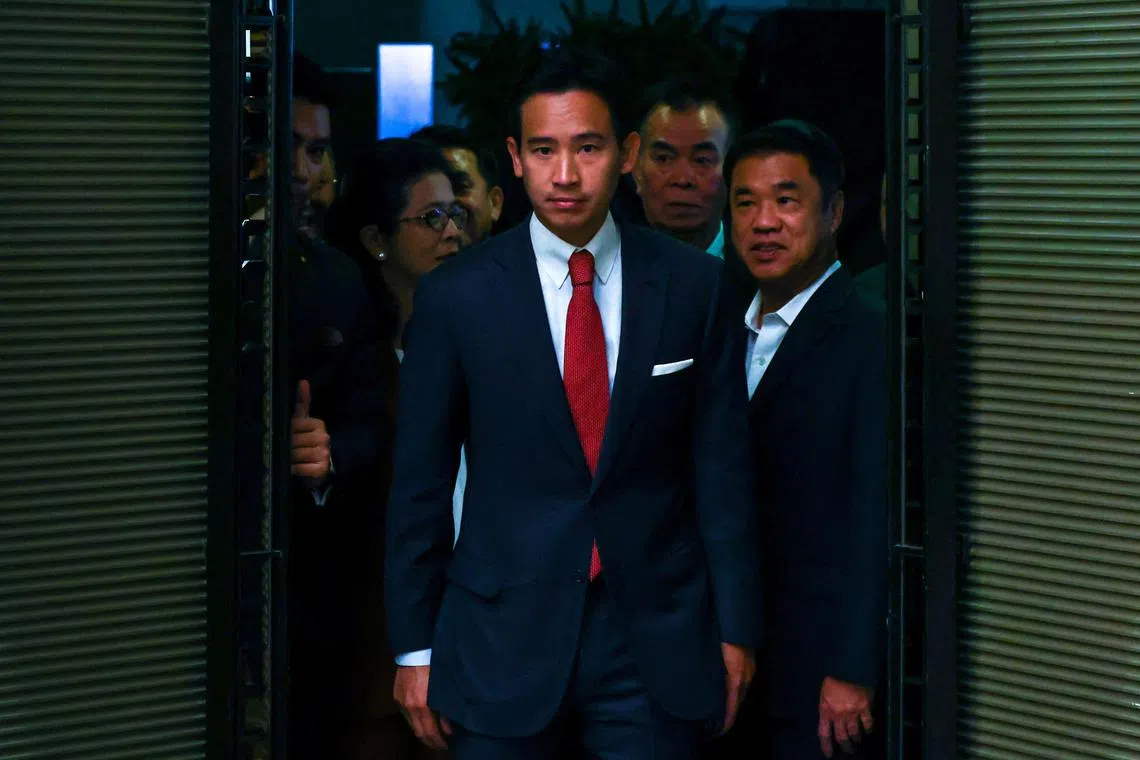Thai election commission endorses May poll results, but retains probe against front runner Pita
Sign up now: Get ST's newsletters delivered to your inbox

Mr Pita Limjaroenrat remains under investigation over alleged illegal ownership of media company shares.
PHOTO: REUTERS
Follow topic:
BANGKOK - Thailand’s election commission has endorsed the results of the May 14 polls, paving the way for the elected 500 Lower House legislators to convene in Parliament. By law, this must take place within 15 days, or by July 3.
But the process of forming a new government is far from straightforward as Mr Pita Limjaroenrat, the leader of the winning Move Forward Party (MFP), remains under investigation over alleged illegal ownership of media company shares.
In announcing the endorsement on Monday, the election commission’s secretary-general, Mr Sawaeng Boonmee, said his agency was still considering the complaint against Mr Pita and reserved the right to have a year to investigate electoral fraud.
A conservative politician alleges that Mr Pita violated rules by owning shares in iTV, which ran a television station that ceased operations in 2007. Mr Pita says he was holding the shares as an administrator of his late father’s estate, but Thai law forbids election candidates from owning media shares.
Thailand’s landmark polls delivered a surprise victory for the youthful, progressive MFP, which trumped much larger pro-democracy parties like Pheu Thai Party as well as those comprising former coup makers who unseated the government in 2014 and took over ruling the country.
The MFP won 151 seats in the House of Representatives on May 14,
The pro-military Palang Pracharath Party, which formed the ruling coalition following polls in 2019, managed just 40 seats. Outgoing Prime Minister Prayut Chan-o-cha’s United Thai Nation Party won 36 seats.
Mr Pita, 42, subsequently announced an eight-party coalition holding a 312-seat majority in the 500-seat House. The other seven parties – Pheu Thai, Prachachat, Thai Sang Thai, Seri Ruam Thai, Fair, Pue Thai Rumphlang and Plung Sungkom Mai – agreed to support Mr Pita’s bid to become prime minister.
But the military-installed legislative system gives 250 appointed senators the right to vote alongside the Lower House on the choice of prime minister. It is not clear if Mr Pita’s bloc can muster the additional votes needed to cross the threshold of 376 and secure his premiership.
Some senators have expressed their reservations about Mr Pita on account of his party’s goal to amend the lese majeste law. This penalises someone who defames or insults the monarch with up to 15 years in jail.
The MFP’s stance on lese majeste, however, was not mentioned in a 23-point memorandum of understanding signed by members of the coalition. Instead, it foregrounded goals like recognising same-sex marriage and ending military conscription except during emergencies.
Negotiations over the allocation of roles among coalition members have reportedly been tense. Pheu Thai politicians, for example, have been vocal about wanting to occupy the Lower House Speaker’s seat – something that the MFP wants to keep for itself in order to drive its agenda forward.
The private sector has warned that delays over the formation of a new government could affect budget disbursements and investor sentiment.
Mr Chaitawat Tulathon, the MFP’s secretary general, said on Monday afternoon: “After the election is over and the results are out, the process of electing a prime minister and forming a government should be based on the majority’s demand.
“It is the best political solution, to end political differences.”
Analysts have warned of public unrest should the MFP be thwarted in forming a government – or running it. Pheu Thai and its predecessor, the Thai Rak Thai Party, were both ousted from government by military coups during the past two decades.
The MFP’s predecessor, the Future Forward Party, was dissolved in 2020 over a loan which its founder gave to the party but which was judged by the constitutional court as a donation.


